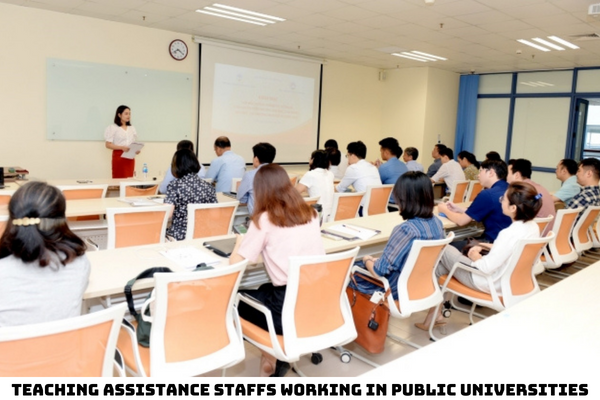Vietnam: What are the criteria for teaching assistance staffs working in public universities? Shall teaching assistance staffs working in public universities receive teaching seniority allowances?
- What are the criteria for teaching assistance staffs working in public universities in Vietnam?
- Shall teaching assistance staffs working in public universities receive teaching seniority allowances in Vietnam?
- What are the regulations on the salary classification for teaching assistance staffs working in public universities in Vietnam?
What are the criteria for teaching assistance staffs working in public universities in Vietnam?
Pursuant to Article 4 of Circular 40/2020/TT-BGDDT, the criteria for teaching assistance staffs working in public universities in Vietnam are:
- Criteria for training and retraining qualifications: Hold a university degree or higher suitable for the job position, industry, or teaching major.
- Criteria for professional capacity:
+ Master the basic knowledge of the subjects assigned to guide practice, and experiment and have general knowledge about a number of relevant subjects in the training major;
+ Understand and properly implement the objectives, plans, contents, and programs of the assigned subjects in the training major; identify the practice and development trend of training and research of the major at home and abroad;
+ Effectively and safely use teaching aids and teaching equipment;
+ Have ability to apply information technology and use foreign languages in performing the duties of teaching assistance staffs (Grade III).
What are the duties of teaching assistance staffs working in public universities in Vietnam?
Pursuant to Clause 1, Article 4 of Circular 40/2020/TT-BGDDT, the duties of teaching assistance staffs working in public universities in Vietnam are:
- Support lecturers (grade III), principal lecturers (grade II), and senior lecturers (grade I) in teaching activities, including Lecture preparation, tutoring, assignment guidance, discussion, experiments, practice, practice and marking of tests;
- Learn and retrain to improve the level of political theory, expertise, professional skills, and teaching methods; participate in practical activities to improve the quality of training and scientific research;
- Participate in the management and work of the Party and mass organizations and perform other tasks in accordance with the regulations on the organization and operation of public universities and other relevant laws.

Shall teaching assistance staffs working in public universities receive teaching seniority allowances in Vietnam?
Pursuant to Article 2 of Decree 77/2021/ND-CP as follows:
Subjects of application
This Decree applies to teachers who are teaching and educating in public universities and academies, schools, training and retraining centers under the state agencies, political organizations, socio-political organizations (hereinafter collectively referred to as public universities) and have been transferred and classified salary according to the Government's Decree No. 204/2004/ND-CP dated December 14, 2004 on the salary regime for cadres, civil servants, public employees and the armed forces, including:
1. Teachers who are specialized education and training officials (bearing codes with the first characters V.07) and specialized vocational education and training officials (bearing codes with the first characters V.09) on the pay list approved by competent agencies, are teaching and educating in public universities funded by the State (including revenues from the state budget and career revenues as prescribed by law).
2. Teachers on the pay list approved by competent agencies are teaching, guiding practice and experiments at training ships, school workshops, stations, camps, practice centers, laboratories and subject rooms of general education and training institutions or continuing education institutions, vocational education and training institutions, and public universities.
3. Subjects who do not fall under the provisions of Clauses 1 and 2 of this Article but hold codes with the first characters V.07 and V.09 are not eligible for teaching seniority allowances.
At the same time, pursuant to Clause 4, Article 2 of Circular 40/2020/TT-BGDDT as follows:
Codes and classification of professional titles
Professional titles of officials teaching in public universities include:
1. Senior Lecturer (Grade I)- Code: V.07.01.01
2. Principal Lecturer (Grade II)- Code: V.07.01.02
3. Lecturer (Grade III) - Code: V.07.01.03
4. Teaching assistance staff (Grade III) - Code: V.07.01.23
According to the above provisions, teachers holding codes with the first characters V.07 and V.09 are not eligible for teaching seniority allowances. Therefore, teaching assistance staffs are not entitled to teaching seniority allowances.
What are the regulations on the salary classification for teaching assistance staffs working in public universities in Vietnam?
Pursuant to Clause 1, Article 10 of Circular 40/2020/TT-BGDDT as follows:
Salary classification
1. The professional titles of teaching officials specified in this Circular may apply the professional salary table for cadres and officials working in non-business units of the State (Table 3) attached to it. According to Decree No. 204/2004/ND-CP dated December 14, 2004 of the Government on salary regime for cadres, civil servants, public employees and armed forces as follows:
a) The professional title of senior lecturer (grade I) shall apply the salary coefficient of class A3 public employees under group 1 (A3.1) with a salary coefficient from 6.20 to 8.00;
b) The professional title of principal lecturer (Grade II) shall apply the salary coefficient of class A2 public employees under group 1 (A2.1) with a salary coefficient from 4.40 to 6.78;
c) The professional titles of lecturer (grade III) and teaching assistance staff (grade III) shall apply the salary coefficient of class A1 public employees with a salary coefficient from 2.34 to 4.98;
Accordingly, teaching assistance staffs shall be applied the salary coefficient of class A1 public employees with a salary coefficient from 2.34 to 4.98.
LawNet
